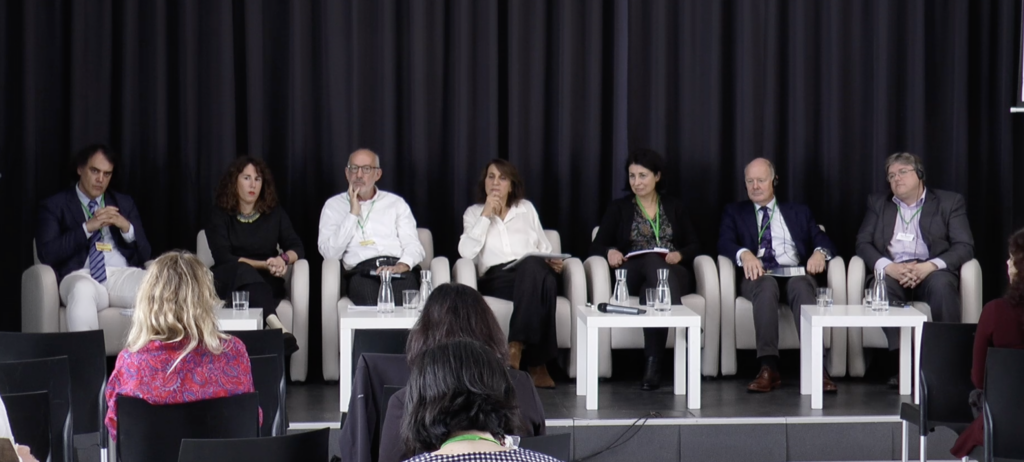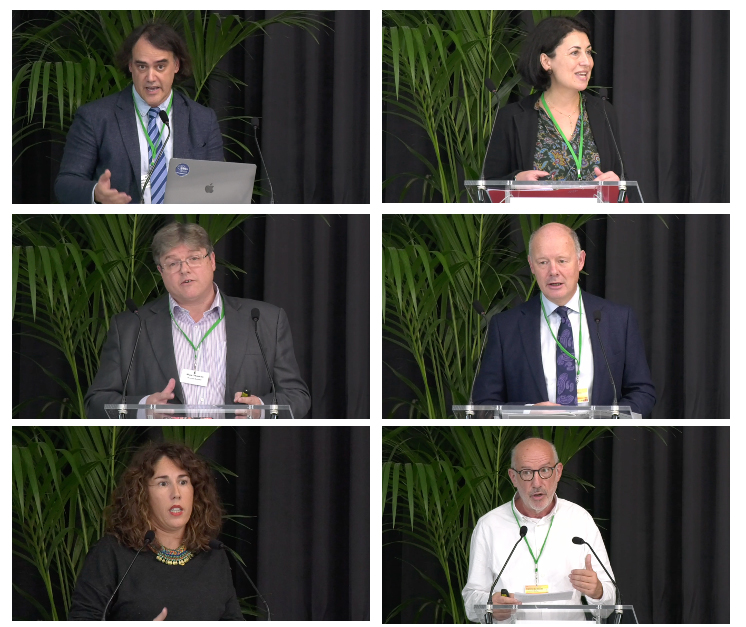- Spain imports thousands of tonnes of seafood from high-risk countries for illegal fishing and imports large quantities of high-risk species including bluefin tuna, squid and swordfish – relying on national import controls alone is not enough.
- Despite the relative strengths of the EU IUU Regulation, the EU’s catch certification scheme and Spain’s commendable import controls, it is still possible for products stemming from IUU fishing to enter the Spanish market, and consequently the EU market, or vice versa.
- Spain’s seafood industry has an important role to play, complementing existing government efforts, in ensuring that the entire supply chain is free of products derived from IUU fishing and human rights abuses, by exercising increased due diligence with regards to seafood imports and trade. Voluntary tools, such as the PAS 1550:2017, co-developed by industry and NGOs, support industry players carry out their due diligence and, when fully implemented, ensure that no IUU fishing products end up on the Spanish market.
Supply chain risks for Spanish seafood were highlighted during an event hosted by the EU IUU Fishing Coalition and ClientEarth in Madrid on 17 November 2022.

Exposure to illegal, unreported and unregulated (IUU) caught fish and human rights or labour abuses are associated both with high-risk trade flows, and high-risk species entering the Spanish supply chain. The EU IUU Fishing Coalition and ClientEarth report ‘IUU fishing, working conditions and the Spanish seafood industry: The importance of supply chain due diligence’ illustrates the IUU fishing risks associated with Spain’s seafood trade and informs the Spanish seafood industry of the risks posed by allowing products that originate from IUU fishing and human rights abuses to enter their supply chain.
Despite the relative strengths of the EU’s Regulation to prevent, deter and eliminate IUU fishing (the ‘EU IUU Regulation’), the EU’s catch certification scheme, and significant efforts made by Spain to improve import controls, further action is required by the industry to assess risks posed by IUU fishing within their supply chain.
“Fish processing companies have a role to play in making Spain the EU Member State that does the most in the fight against illegal fishing, also, in helping to ensure that what they sell is not the result of IUU fishing activities.”
Dr. Gabriela A. Oanta, University of A Coruña
“There is a lot at stake, not only the health of the ocean but also links to human health are key in this debate. The oceans can contribute in a healthy and sustainable way to address two major challenges: the reduction of the number of people who are malnourished, and the high level of obesity, which is increasing at an unprecedented rate globally.”
Dr. Sebastián Villasante, University Santiago de Compostela
High-risk species
Specific species, including Atlantic bluefin tuna and swordfish, present high risks of being associated with IUU fishing, while others like squid are harvested in major and rapidly expanding fisheries that are not being managed at all.
Squid
In 2020, over 10,000 tonnes of squid were imported by Spain from Argentina and China. Global squid fisheries are largely unregulated and there have been reports of illegal fishing within Chinese squid fisheries, including in the waters of Argentina. Spanish vessels have also been found to ‘go dark’ by switching off their tracking systems close to Argentina’s national waters.
“If you buy squid, you need to recognise that 80% of the world’s squid fisheries are unregulated. So, if you buy squid, you have a very good chance of having IUU within your supply chains.”
Huw Thomas, 3 Pillars Seafood
“Squid fisheries are unregulated, occurring mostly in international waters by actors who are not very responsible and are operating in waters where there is a lack of agreement between countries. This is important because squid is in all restaurants in Spain. We need the Spanish hotels, restaurants, catering market and their suppliers involved in this process.”
Carmen Gonzalez-Valles, Sustainable Fisheries Partnership
Antonio Álvarez, Sustainability Director at the Profand Group, highlighted changes that have been made in Peru to counter human rights issues and poor labour practices in the unregulated small-scale squid fleet. Through implementation of a Fisheries Improvement Project, which gave visibility to the issues in both Europe and Peru, and by involving European processors, the [Peruvian] government also started to understand the importance of regulating the fleet.
“We must work together to achieve our objectives, together we will go further. As citizens, as people, we need to join forces to fight against these issues and to achieve a simple and sustainable healthy life.”
Antonio Álvarez, Profand Group
Atlantic bluefin tuna
Large quantities of Atlantic bluefin tuna are imported into Spain annually, from both EU Member States and non-EU countries, and illegal activities have been uncovered within the Atlantic bluefin tuna trade. For example, Spanish authorities announced the arrest of multiple actors involved in an extensive operation of illegal Atlantic bluefin tuna trade. The operation led by Europol, known as ‘Operation Tarantelo’), involved an extensive network of fishing companies and distributors.
Swordfish
As a valuable commodity, there have been documented cases of mislabelling within the swordfish market. For example, there have been cases in which fish marketed as swordfish, imported from Spain to Malta, was later determined to be mako shark. Spain imports large quantities of swordfish from both EU Member States and non-EU countries. Businesses must be aware of the risk posed by seafood fraud.
“For Spain in particular we have to ask why 100,000 tonnes of swordfish imports have shifted from Spain, who have done more on import controls, to Portugal.”
Peter Horn, The Pew Charitable Trusts
High-risk trade flows
Spain imports large quantities of seafood from countries currently yellow-carded under the EU IUU Regulation. These include Ecuador (113,000 tonnes in 2019) and Panama (10,000 tonnes in 2019) which were yellow-carded in October and December 2019, respectively. A yellow card serves as a formal EU warning of potential failures in fisheries management that, if not addressed, could lead to a red car which includes an EU fisheries trade ban for imports from that country, among other sanctions. Spanish businesses sourcing seafood from these countries should apply increased due diligence in order to ensure that no products linked to IUU fishing are marketed in Spain.
“Over 150,000 tons of fish is imported from Ecuador, Panama, and Vietnam. These are all ‘carded’ countries that the EU has identified as not fulfilling all their governmental responsibilities in the management of the fish or the fleets which are supplying your value chains.”
Peter Horn, The Pew Charitable Trusts
Large quantities of seafood are also imported from high-risk countries for IUU fishing (according to the IUU Fishing Index). For example, over 100,000 tonnes of seafood was imported from China into Spain in both 2018 and 2019. In both 2019 and 2021, China received the highest IUU fishing score globally on the IUU Fishing Index. Even if a country is not carded, due diligence must be applied throughout the entire supply chain when importing seafood from these high-risk countries.
“16% of the squid imported into Spain doesn’t stay in Spain. It is processed in Galicia and then exported to 60 countries, including other EU countries, the United States and Japan. These are huge, global distribution channels.”
Antonio Álvarez, Profand Group

Next steps for Spain’s seafood industry
Spain’s seafood industry has an important role to play in ensuring that the entire supply chain is free of products derived from IUU fishing by exercising due diligence on seafood imports and trade.
This can be achieved through the implementation of voluntary measures such as those laid out in the ‘Code of practice for exercising due diligence in establishing the legal origin of seafood products and marine ingredients’ (PAS 1550:2017). A Spanish edition of the PAS 1550:2017 is now available.
“If there is one message you should take away from today it is ‘map your supply chains and know your vessels.’ Unless you know the vessels that are supplying you cannot address fishing management issues, you cannot manage regulatory issues and you cannot manage what is happening to the people on board those vessels, where they go and what they are exposed to. So, you need to know your vessels.”
Huw Thomas, 3 Pillars Seafood
“Good supply chain mapping will help highlight to governments where they need to focus their attention, where they can support you better,and how they can aid in providing fish, free of the taint of IUU, to supermarkets.”
Peter Horn, The Pew Charitable Trusts
Tools such as PAS 1550 include guidance on information that can be requested by processors, importers and buyers as part of their due diligence process and risk assessments.
Download the presentations
Global economic losses and risks of labour abuse and IUU fishing. Sebastian Villasante
Qué funciona y qué no contra la pesca INDNR. Gabriela Oanta
IUU Fishing, Working Conditions and the Spanish Seafood Industry. Peter Horn
The Global Squid Supply chain roundtable. Carmen Gonzalez Valles
Watch the event recording
Original (Spanish and English)
English
Spanish
